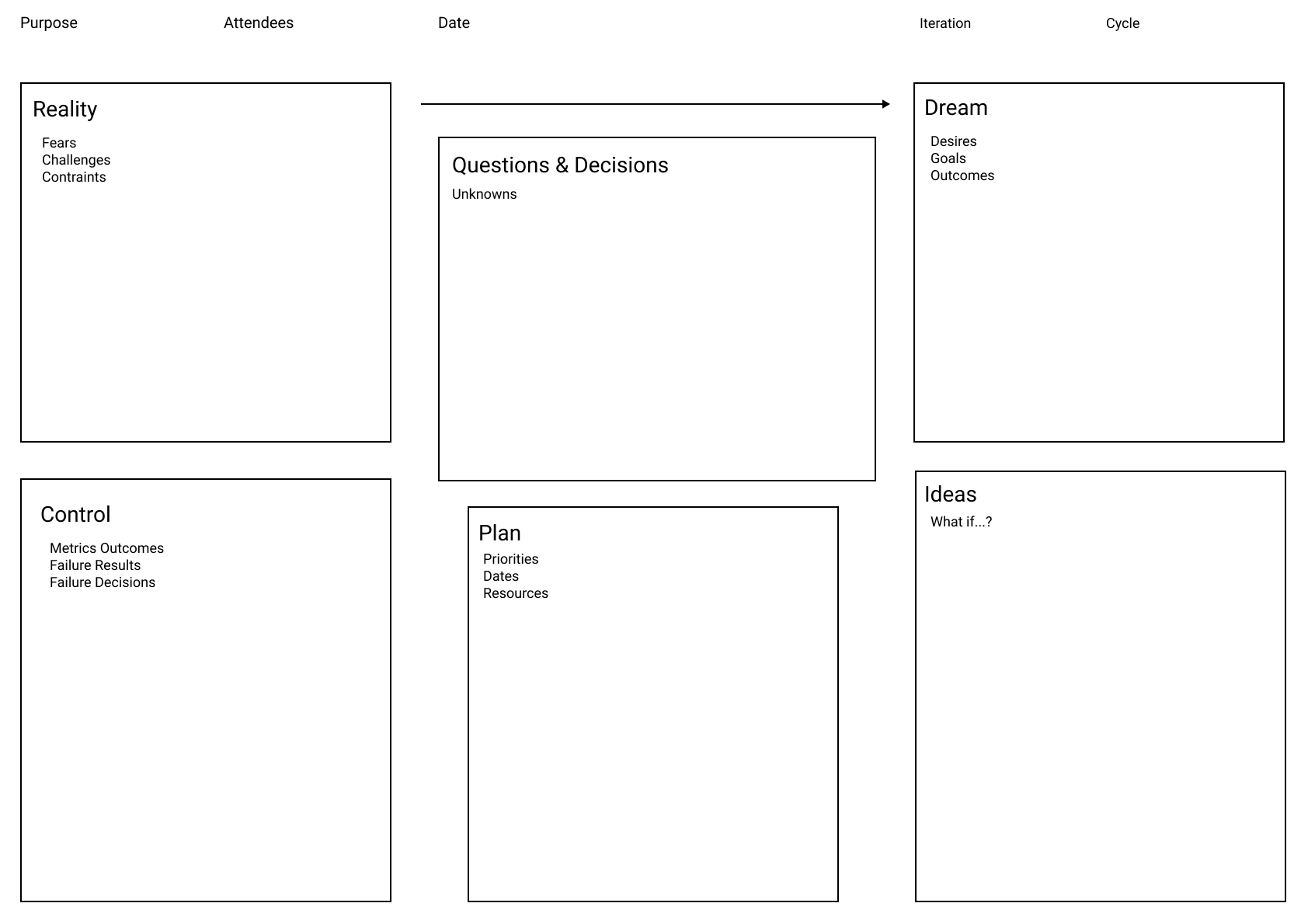Meetings
How many lifetimes are wasted every minute across the globe in pointless meetings?
Make Meetings Matter: Meetings must have a clear purpose and agenda and should be no longer than 30 minutes duration.
Context
- Projects: The subject of the meeting
- Meaningful Progress: The intention for meeting
- Internal Writing: Preparation for meeting
- Note Taking: Capturing value`
- Prioritisation: Agreeing what is important
- Decision Making: Process for placing bets
- Decision Journal: Historical record to learn from
Purpose
Reasons for holding/attend a meeting:
Sport
You can learn a lot about whether you want to do business with a person by the way they play a game.
Agenda: Have fun while meeting new people and observing how they compete.
Outcome:
- Followup with people that play the game in the right spirit.
Discovery
Information-sharing, see if you share the same world view, explore different perspectives.
Agenda The agenda outlines topics to be covered, but additional topics can be covered during Q&A.
Attendees: Open-ended attendance with one-way communication from the meeting host presenting information with Q&A to follow.
Outcome:
- Grow Awareness
- Expand Knowledge Surface
- Identify Trends and Patterns to "watch out" for.
Debate
Agenda identifies topics for discussion.
Attendees: Invite a maximum of 15 with open discussion between all participants
Outcome:
- Interpret the world from different perspectives.
- Narrow down criteria for decision-making.
Accountability
Attendees: Trusted connections that have alternative perspectives to drive meaningful progress.
- Review value of outcomes vs expectations
- Enter the danger
- Reinvest in growth stories that crystallize intent
- time-block next week's priorities.
Outcomes:
- Combat Decision Fatigue
- Relieve What Next? Dis-ease
- Conviction and Commitment
Decision
No decision identified? No purpose having a meeting.
Attendees: Only people that have authority to make decision are in attendance and have clarity that they have the authority to decide. Invite 3 to 7 attendees.
Outcome:
- dedicated resources agreed, time, money, assets
- a flowchart documenting logic for decision journal
- universal documented commitment to agreed action
Agenda
Send the meeting agenda in advance explaining the reason for the meeting and identify the decision(s) and expected outcomes to come from the meeting.
Provide materials that minimize the need for information-transfer during meetings to save time and direct alignment of creative intent and commitment.
Before requesting a meeting ask:
- Can I send message to request desired input or action instead?
- If not, add reasoning why is a meeting important in the invite.
Attendance
Invite people that can make decisions or will be directly accountable for outcomes.
Before confirming attendance ask:
- What will I gain that I can't gather via meeting notes or recording?
- Is there anything specific only I can contribute?
Preparation
Before any meeting:
- Re-read the agenda first (allow 5 mins)
- Someone must record minutes
- Agree delegated actions for next meeting
Meetings without minutes are parties.
Taking Minutes
Effective note-taking is critical due to the fast paced nature of meetings. Your system must be organised and efficienct, to recap next steps and commitments at the end of the meeting, and capture key information.

Use boxes to provide quick context checks for topic of exploration. Pen and paper over digital tools when interacting with clients to focus on engagement. Have a system to capture tangential insights and questions to be followed up on later. A recommended note-taking system includes the following components:
- Date and title of the meeting at the top, along with a list of participants.
- A sketch of the seating arrangement, to help jog memory.
- General notes from the meeting are taken on the top half of the paper.
- To-dos are divided into sections for yourself, your firm, and the client, and placed on the bottom quarter.
- The middle of the page is dedicated to meeting-specific objectives or key ideas.
Before entering a meeting, you should know what you want to get out of it. This could be specific data, ideas, commitments, etc.
If it is not written down it can't of mattered
Checklist
Review best practice protocols for engaging with others for the purpose of aligning in taking meaningful action.
- Prepare for the meeting by defining your objectives.
- Create a system for note-taking that categorizes information effectively.
- Use your note-taking system consistently for it to be most effective.
- Recap the meeting and commitments at the end for clarity and confirmation.
- Use pen and paper for note-taking to focusing on engagement.
- Practice reflective listening
- ask questions to clarify understanding.
- pay attention to non-verbal communication.
Debrief
Debrief after the meeting to firm up perspectives and reach consensus view on key takeaways, then convert that into digital format.
Map meeting notes to JTBD Stories for standardised analysis.
Communicate outcomes of meetings along with impact on roles and processes.
Commitment
People bring their own motivations to meetings and irm agreements during a meeting often become maybes in the following days and weeks.
Agreements only matter if they are implemented, commit with bets to secure commitment. Note that bets can be made in fun.
To help ensure agreements a followed up on, make sure the process forward is clearly mapped out with required efforts understood and appreciated by all.
Make meetings matter, align intentions and secure commitment